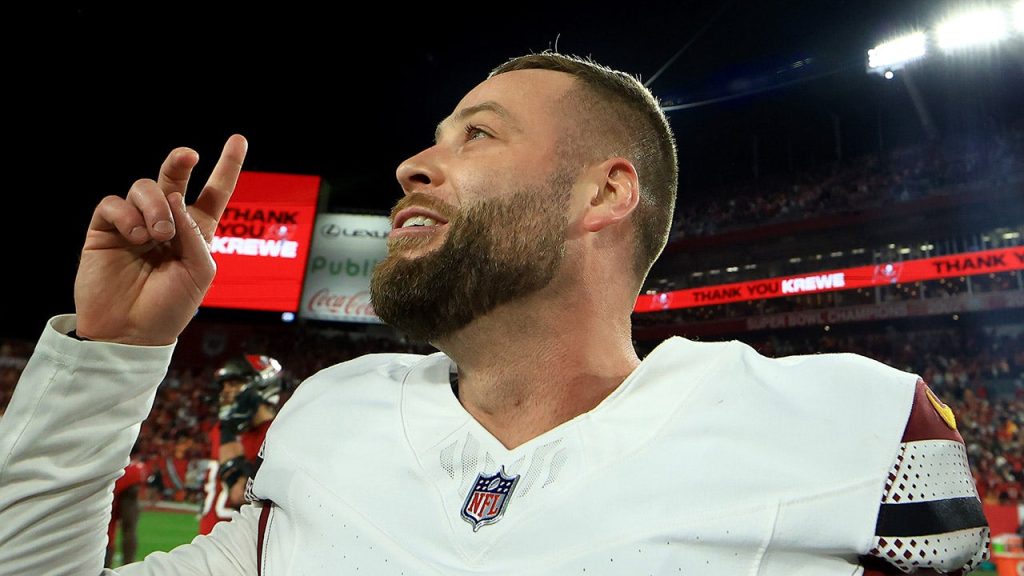Zane Gonzalez, the Washington Commanders’ placekicker, became a subject of intrigue during the team’s Wild Card victory over the Tampa Bay Buccaneers. Television cameras captured his pre-kick routine, a series of repetitive actions including fixing his hair, adjusting his socks, and repeatedly donning and removing his helmet. While some viewers might have dismissed this as mere sports superstition, Gonzalez has clarified that these behaviors stem from his lifelong struggle with obsessive-compulsive disorder (OCD). His actions, while seemingly peculiar to outside observers, represent a coping mechanism for a condition that significantly impacts his daily life.
Gonzalez’s public acknowledgment of his OCD offers a crucial glimpse into the often-misunderstood nature of the disorder. OCD is not simply a matter of quirky habits or a desire for orderliness. It’s a complex neurobiological condition characterized by intrusive, unwanted thoughts (obsessions) and repetitive behaviors or mental acts (compulsions) performed to alleviate the anxiety caused by these thoughts. While the specific manifestations of OCD vary widely among individuals, the underlying experience of distress and interference with daily functioning is a common thread. Gonzalez’s pre-kick ritual, while seemingly odd, represents his personal attempt to manage the anxiety produced by his OCD in the high-pressure environment of professional football.
The kicker’s experience underscores the significant impact OCD can have on an individual’s life, extending beyond the often-stereotyped images of excessive handwashing or meticulous organization. For Gonzalez, the compulsions manifest in his pre-kick routine, a ritual he performs to quell the intrusive thoughts and anxieties associated with his OCD. He acknowledges the unusual appearance of his actions, stating, “I, above everybody else, realize how crazy it looks doing it. I’m aware. But at the same time, you can’t help it.” This statement highlights the involuntary nature of compulsions and the difficulty individuals with OCD face in controlling them, despite recognizing their irrationality.
Gonzalez’s openness about his OCD isn’t a recent development. He previously discussed his struggles with the disorder in 2017, describing the challenges it presents in his daily life. He characterized OCD as making him a “perfectionist” and “more detail-oriented,” while also acknowledging its disruptive effects off the field. This long-standing awareness and willingness to discuss his condition illustrates his proactive approach to managing OCD and destigmatizing mental health challenges. He has developed strategies to mitigate the impact of the disorder on his life, integrating these coping mechanisms into his game-day preparations. The helmet ritual, he explains, is the final step in his routine, a culminating act that allows him to mentally prepare for the crucial task ahead.
Gonzalez’s journey back to the NFL adds another layer to his story. After a period of absence from professional football in 2022 and 2023, he was signed to the Washington Commanders’ practice squad in November 2024 and subsequently elevated to the active roster. His successful return, culminating in the game-winning field goal against the Buccaneers, is a testament to his resilience and determination. He has navigated the challenges of OCD while simultaneously pursuing his career at the highest level of competition. His 5-for-7 field goal record and perfect extra point percentage this season underscore his ability to perform under pressure, despite the added layer of complexity presented by his OCD.
Zane Gonzalez’s story transcends the realm of sports. It’s a story of perseverance, resilience, and the courage to confront and manage a chronic mental health condition. His willingness to openly discuss his OCD contributes to a broader conversation about mental health, challenging stereotypes and fostering greater understanding. By sharing his experiences, he provides a powerful example of how individuals can thrive in their chosen fields while navigating the complexities of mental health challenges. His game-winning kick was not just a victory for the Washington Commanders; it was a personal triumph for Gonzalez, a testament to his ability to overcome adversity and succeed both on and off the field.

